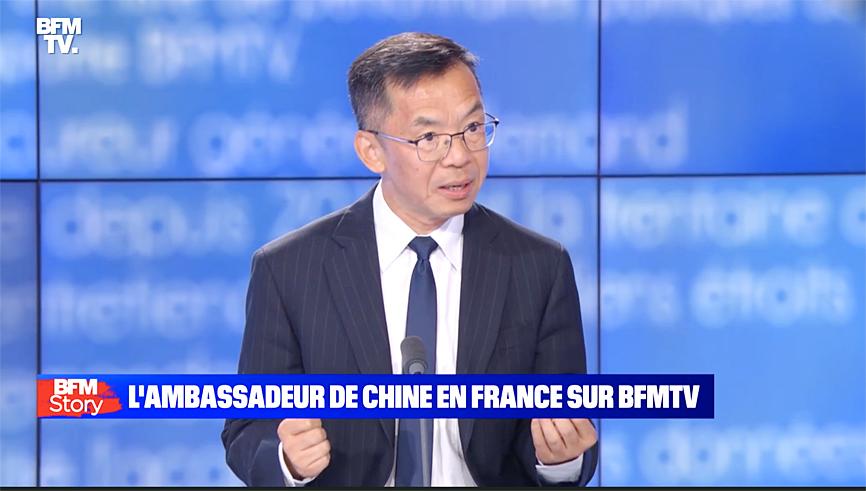European and US officials condemned comments from Chinese Ambassador to France Lu Shaye (盧沙野), after he on Wednesday said that Taiwanese would be “re-educated” after any annexation by China.
In an interview on French television, Lu accused the Democratic Progressive Party of “extremist” propaganda and turning Taiwanese against “reunification” with China.
“We will re-educate. I’m sure that the Taiwanese population will again become favorable of the reunification and will become patriots again,” Lu told BFM TV.

Photo: Screengrab from the BFM TV Web site
The term “re-education” has been used to describe Chinese authorities’ treatment of Uighurs and other Muslim minority groups in Xinjiang.
European Parliament Subcommittee on Security and Defense Chairwoman Nathalie Loiseau was among the Western officials who on Thursday criticized Lu’s remarks on Twitter.
“To those who are indignant at [US House of Representatives Speaker] Nancy Pelosi’s trip to Taiwan, I advise to reserve their indignation for the scandalous remarks of the Chinese ambassador, who promises the reunification of Taiwan against the will of its inhabitants and then their ‘re-education,’” she wrote. “This is where the scandal lies.”
Pelosi visited Taiwan earlier this week, with China launching live-fire drills in retaliation.
“Chinese threats to Taiwan, their destruction of democracy in Hong Kong & genocide of the Uyghurs show the need for a united & strong EU and alliance with US,” European lawmaker Guy Verhofstadt wrote.
“Genocide, reeducation, gulags, all being normalized for a new age of totalitarian evil,” wrote Paul Massaro, a Helsinki-based senior policy adviser to the US government.
In Washington, Center for Uyghur Studies director Abdul Hakim wrote that Lu’s remarks were reminiscent of Xinjiang concentration camps.
“Don’t believe us, now China is saying it will set up a concentration camp in Taiwan,” he wrote.
Reporters Without Borders president Pierre Haski said in an interview with the Central News Agency (CNA) that Lu’s statement was rooted in “the ideological differences between China and democracies.”
“I don’t think he [Lu] has a good grasp on the word ‘re-education.’ The impact of this word on Western audiences, it’s a very vicious, devastating statement,” he said.
Marc Julienne, director of the Centre for Asian Studies at the French Institute of International Relations, told CNA he felt that “re-education” was the worst word Lu could have used in front of a European audience, given Europe’s experiences during World War II.
“This remark not only showed the French what China’s intentions toward Taiwan are, but it also may further damage Lu’s image and that of China,” he said.

MISINFORMATION: The generated content tends to adopt China’s official stance, such as ‘Taiwan is currently governed by the Chinese central government,’ the NSB said Five China-developed artificial intelligence (AI) language models exhibit cybersecurity risks and content biases, an inspection conducted by the National Security Bureau (NSB) showed. The five AI tools are: DeepSeek, Doubao (豆包), Yiyan (文心一言), Tongyi (通義千問) and Yuanbao (騰訊元寶), the bureau said, advising people to remain vigilant to protect personal data privacy and corporate business secrets. The NSB said it, in accordance with the National Intelligence Services Act (國家情報工作法), has reviewed international cybersecurity reports and intelligence, and coordinated with the Ministry of Justice Investigation Bureau and the National Police Agency’s Criminal Investigation Bureau to conduct an inspection of China-made AI language

BOOST IN CONFIDENCE: The sale sends a clear message of support for Taiwan and dispels rumors that US President Donald Trump ‘sold out’ the nation, an expert said The US government on Thursday announced a possible sale to Taiwan of fighter jet parts, which was estimated to cost about US$330 million, in a move that an expert said “sends a clear message of support for Taiwan” amid fears that Washington might be wavering in its attitude toward Taipei. It was the first announcement of an arms sale to Taiwan since US President Donald Trump returned to the White House earlier this year. The proposed package includes non-standard components, spare and repair parts, consumables and accessories, as well repair and return support for the F-16, C-130 and Indigenous Defense Fighter aircraft,

CHECKING BOUNDARIES: China wants to disrupt solidarity among democracies and test their red lines, but it is instead pushing nations to become more united, an expert said The US Department of State on Friday expressed deep concern over a Chinese public security agency’s investigation into Legislator Puma Shen (沈伯洋) for “secession.” “China’s actions threaten free speech and erode norms that have underpinned the cross-strait ‘status quo’ for decades,” a US Department of State spokesperson said. The Chongqing Municipal Public Security Bureau late last month listed Shen as “wanted” and launched an investigation into alleged “secession-related” criminal activities, including his founding of the Kuma Academy, a civil defense organization that prepares people for an invasion by China. The spokesperson said that the US was “deeply concerned” about the bureau investigating Shen

LIMITS: While China increases military pressure on Taiwan and expands its use of cognitive warfare, it is unwilling to target tech supply chains, the report said US and Taiwan military officials have warned that the Chinese People’s Liberation Army (PLA) could implement a blockade within “a matter of hours” and need only “minimal conversion time” prior to an attack on Taiwan, a report released on Tuesday by the US Senate’s China Economic and Security Review Commission said. “While there is no indication that China is planning an imminent attack, the United States and its allies and partners can no longer assume that a Taiwan contingency is a distant possibility for which they would have ample time to prepare,” it said. The commission made the comments in its annual